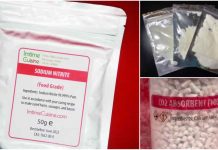GRAND RAPIDS, Mich. – LIVING -It is known that people who have attempted suicide have ongoing inflammation in their blood and spinal fluid. Now, a collaborative study from research teams in the U.S., Sweden and Australia published in Translational Psychiatry shows that suicidal patients have a reduced activity of an enzyme that regulates inflammation and its byproducts.
The study is the result of a longstanding partnership between the research teams of Professor Sophie Erhardt, Karolinska Institutet Professor Lena Brundin at Van Andel Research Institutein Grand Rapids, Michigan, and Professor Gilles Guillemin at Macquarie University in Australia. The overall aim of the research is to find ways to identify suicidal patients.
Biological factors
Currently, there are no biomarkers for psychiatric illness, namely biological factors that can be measured and provide information about the patient’s psychiatric health. If a simple blood test can identify individuals at risk of taking their lives, that would be a huge step forward, said Erhardt, a Professor at the Department of Physiology and Pharmacology at the Karolinska Institutet, who led the work along with Brundin.
The researchers analyzed certain metabolites, byproducts formed during infection and inflammation, in the blood and cerebrospinal fluid from patients who tried to take their own lives. Previously it has been shown that such patients have ongoing inflammation in the blood and cerebrospinal fluid. This new work has succeeded in showing that patients who have attempted suicide have reduced activity of an enzyme called ACMSD, which regulates inflammation and its byproducts.
“We believe that people who have reduced activity of the enzyme are especially vulnerable to developing depression and suicidal tendencies when they suffer from various infections or inflammation. We also believe that inflammation is likely to easily become chronic in people with impaired activity of ACMSD,” said Brundin.
Important balance
The substance that the enzyme ACMSD produces, picolinic acid, is greatly reduced in both plasma and in the spinal fluid of suicidal patients. Another product, called quinolinic acid, is increased. Quinolinic acid is inflammatory and binds to and activates glutamate receptors in the brain. Normally, ACMSD produces picolinic acid at the expense of quinolinic acid, thus maintaining an important balance.
“We now want to find out if these changes are only seen in individuals with suicidal thoughts or if patients with severe depression also exhibit this. We also want to develop drugs that might activate the enzyme ACMSD and thus restore the balance between quinolinic and picolinic acid,” Erhardt said.
The study was funded with the support of the Swedish Research Council, Region Skåne and Central ALF funds. Additional support came from National Institute of Mental Health (NIMH), the American Foundation for Suicide Prevention, Van Andel Research Institute, Rocky Mountain MIRECC, the Merit Review CSR & D and the Joint Institute for Food Safety and Applied Nutrition (University of Maryland), and the Australian Research Council. Several of the researchers have indicated that they have business interests, which are recognized in the article.
Publication
Lena Brundin, Carl M. Sellgren, Chai K. Lim, Jamie Grit, Erik Palsson, Mikael Landen, Martin Samuelsson, Christina Lundgren, Patrik Brundin, Dietmar Fuchs, Teodor T. Postolache, Lil Träskman-Bendz, Gilles J. Guillemin, Sophie Erhardt.
Translational Psychiatry, published online August 2, 2016, doi: 10.1038 / TP.2016.133.
ABOUT VAN ANDEL RESEARCH INSTITUTE
Van Andel Institute (VAI) is an independent nonprofit biomedical research and science education organization committed to improving the health and enhancing the lives of current and future generations. Established by Jay and Betty Van Andel in 1996 in Grand Rapids, Michigan, VAI has grown into a premier research and educational institution that supports the work of more than 360 scientists, educators and staff. Van Andel Research Institute (VARI), VAI’s research division, is dedicated to determining the epigenetic, genetic, molecular and cellular origins of cancer, Parkinson’s and other diseases and translating those findings into effective therapies. The Institute’s scientists work in onsite laboratories and participate in collaborative partnerships that span the globe. 100% To Research, Discovery & Hope® http://www.








